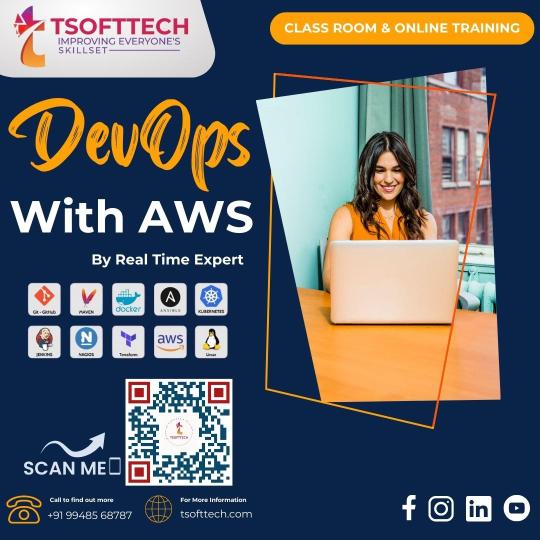#Cloud Computing and DevOps
Explore tagged Tumblr posts
Text
DevOps & Cloud: A Perfect Tech Partnership
Cloud and DevOps go hand in hand—learn how their integration accelerates development, improves deployment, and enhances scalability.
0 notes
Text
Educational institutions in Thane are also stepping up by offering comprehensive training programs in cloud computing and DevOps. These programs are tailored to meet industry requirements, ensuring that students gain hands-on experience with cloud platforms and DevOps tools.
0 notes
Text
64 vCPU/256 GB ram/2 TB SSD EC2 instance with #FreeBSD or Debian Linux as OS 🔥

38 notes
·
View notes
Text
Best DevOps Engineering Training and Cloud Computing Certification for Career Growth
Take your career to new heights with top-tier DevOps training programs and the best cloud computing certification. Our DevOps training provider offers over 100 hands-on projects and real-world scenarios, giving you an immersive learning experience in the DevOps cycle. Perfect for those aiming to become DevOps engineers or seeking to expand their expertise in Cloud computing, our courses are designed to equip you with the skills and knowledge needed to succeed. Whether you want to dive into DevOps tools or learn industry-standard processes, our training programs prepare you for success.
2 notes
·
View notes
Text
Secure and Scalable Cloud Server Management at Atcuality
For businesses seeking to enhance scalability and maintain top-tier security, Atcuality provides unparalleled cloud server management services. Our solutions cover all aspects of cloud server maintenance, including load balancing, patch management, data backups, and disaster recovery planning. Our experienced professionals work with cutting-edge tools to ensure that your servers are secure, efficient, and scalable to meet changing business needs. Whether you operate in e-commerce, finance, or technology, we tailor our services to align with your operational goals. With Atcuality as your trusted partner, you can focus on driving growth while we handle the technical complexities of cloud management.
#seo marketing#seo services#artificial intelligence#azure cloud services#seo agency#digital marketing#seo company#iot applications#ai powered application#amazon web services#ai applications#virtual reality#augmented reality agency#augmented human c4 621#augmented and virtual reality market#augmented intelligence#augmented reality#cloud security services#cloud computing#cloud services#cloud service provider#cloud server hosting#software#devops#information technology#cash collection application#task management#blockchain#web developing company#web development
2 notes
·
View notes
Text

🚀 Ready to Master DevOps? 🚀
The wait is over! Our New DevOps Online Training starts On Nov 9, 2024, at eMexo Technologies! 📅💻 Learn how to streamline development, automate processes, and take your IT skills to the next level! 🔧✨
💡 Don’t miss this chance to join the future of IT! Our hands-on training will equip you with the skills to thrive in a DevOps environment! 🏆
👉 CLICK THE LINK https://www.emexotechnologies.com/courses/devops-certification-training-course/
🎯 Why Choose Us?
Expert Instructors with Industry Experience
Flexible Learning Schedules
Real-time Support & Guidance
Placement Assistance
Hurry, limited seats are available! 🎟️
Call / Whatsapp us:
📞 +91 9513216462
#devops tools#devops#cloud computing training#ittraining#techeducation#emexotechnologies#bangalore#electroniccity#traininginstitute#education#learning#course#training#careers#tech skills
2 notes
·
View notes
Text

Tsofttech is a One of the best quality training center for online, Classroom and Corporate trainings In Hyderabad . We are providing DEVOPS Online Training through world wide. Tsofttech is excellent DEVOPS Training center in Hyderabad. After course we will give support for certification, Resume preparation and how to prepare for interviews.
For More: https://tsofttech.com/devops-online-training
Attend Free Demo On DevOps With AWS Sign Up Now: https://bit.ly/3rp0W84 To Boost Your IT Career to Next Level by Expert Faculty's. Register now to reserve your spot.
3 notes
·
View notes
Text

Accelerate your cloud journey with CloudAstra’s DevOps services. Automate deployments, improve CI/CD pipelines, and ensure scalable, efficient cloud infrastructure.
0 notes
Text

5 Key Benefits of Azure Cloud Migration Services
Migrating to the cloud is no longer optional — it's essential. This infographic highlights the top 7 benefits of using Azure Cloud Migration Services for modern businesses. From cost optimization and enhanced security to faster deployment and improved scalability, Microsoft Azure provides a flexible, secure, and efficient platform for digital transformation.
Discover how Azure helps streamline your IT infrastructure while improving business continuity and integration with existing Microsoft tools. Whether you're planning a full migration or hybrid setup, these insights will help you understand why Azure is the platform of choice.
#Azure Cloud#Cloud Migration#Azure Migration Services#Microsoft Azure#Cloud Computing#IT Modernization#DevOps#Cloud Strategy
0 notes
Text
This Software Training Institute in Bangalore is Secretly Powering India's Top Tech Careers – Discover How
In the buzzing tech capital of India, one Software Training Institute in Bangalore is quietly making waves—and transforming ordinary learners into extraordinary IT professionals. Welcome to Kodestree, where innovation meets education, and students don’t just learn—they thrive.

Whether you’re fresh out of college or a working professional seeking career growth, Kodestree’s software training programs are tailored to match industry demands. From full-stack development, data science, and DevOps to cloud technologies like Azure and AWS, this institute blends practical training with real-world projects—equipping learners with job-ready skills.
Why Kodestree is the Go-To Software Training Institute in Bangalore:
✅ 100% Placement Support with tie-ups across leading MNCs
💻 Hands-On Live Projects from real-time industry use cases
🎓 Classroom & Online Training Options for flexible learning
📜 Industry-recognized Certifications to boost your résumé
🧑🏫 Mentorship by IT Veterans with 10+ years of field experience
📈 Custom paths for career switchers and upskillers
The institute also stands out for its interactive classrooms, up-to-date curriculum, and a thriving community of tech enthusiasts. Unlike outdated training centers, Kodestree is future-forward—teaching tools and tech stacks that top companies are hiring for right now.
So, if you're hunting for the best software courses in Bangalore, Kodestree might just be your golden ticket.
📍 Location Highlight:
Kodestree is conveniently located at Sunrise Heights #5, Street No:15, Green Garden Layout, Sai Baba Temple Road, Kundalhalli Gate, Bengaluru - 560037.
📞 Contact: +91-7015941166 🌐 Website: https://kodestree.com
#Software Training Institute in Bangalore#Best Software Courses in Bangalore#IT Training Institute in Bangalore#Software Development Course Bangalore#Coding Classes in Bangalore#Software Training with Placement in Bangalore#Top IT Courses in Bangalore#Full Stack Developer Course Bangalore#Data Science Course in Bangalore#Python Training Institute in Bangalore#Java Training Institute in Bangalore#DevOps Course in Bangalore#Cloud Computing Training Bangalore#Job Oriented Software Courses Bangalore.
1 note
·
View note
Text
Trends to Follow for Staunch Scalability In Microservices Architecture

Scalability in microservices architecture isn’t just a trend—it’s a lifeline for modern software systems operating in unpredictable, high-demand environments. From streaming platforms handling millions of concurrent users to fintech apps responding to real-time transactions, scaling right means surviving and thriving.
As a software product engineering service provider, we’ve witnessed how startups and enterprises unlock growth with a scalable system architecture from day 1. It ensures performance under pressure, seamless deployment, and resilience against system-wide failures.
And as 2025 brings faster digital transformation, knowing how to scale smartly isn’t just beneficial—it’s vital.
At Acquaint Softtech, we don’t just write code—we craft scalable systems!
Our team of expert engineers, DevOps specialists, and architectural consultants work with you to build the kind of microservices infrastructure that adapts, survives, and accelerates growth.
Let Talk!
Why Scalability in Microservices Architecture Is a Game-Changer
Picture this: your product’s user base doubles overnight. Traffic spikes. Transactions shoot up. What happens?
If you're relying on a traditional monolithic architecture, the entire system is under stress. But with microservices, you’re only scaling what needs to be scaled!
That’s the real power of understanding database scalability in microservices architecture. You’re not just improving technical performance, you’re gaining business agility!
Here’s what that looks like for you in practice:
Targeted Scaling: If your search service is flooded with requests, scale that single microservice without touching the rest!
Fail-Safe Systems: A failure in your payment gateway won’t crash the whole platform—it’s isolated.
Faster Deployments: Teams can work on individual services independently and release updates without bottlenecks.
📊 Statistics to Know:
According to a 2024 Statista report, 87% of companies embracing microservices list scalability as the #1 reason for adoption—even ahead of speed or modularity. Clearly, modern tech teams know that growth means being ready.
Scalability in microservices architecture ensures you’re ready—not just for today’s demand but for tomorrow’s expansion.
But here’s the catch: achieving that kind of flexibility doesn’t happen by chance!
You need the right systems, tools, and practices in place to make scalability effortless. That’s where staying updated with current trends becomes your competitive edge!
Core Principles that Drive Scalability in Microservices Architecture
Understanding the core fundamentals helps in leveraging the best practices for scalable system architecture. So, before you jump into trends, it's essential to understand the principles that enable true scalability.
Without these foundations, even the most hyped system scalability tools and patterns won’t get you far in digital business!
1. Service Independence
It's essential for each microservice to operate in isolation. Decoupling allows you to scale, deploy, and debug individual services without impacting the whole system.
2. Elastic Infrastructure
Your system must incorporate efficient flexibility with demand. Auto-scaling and container orchestration (like Kubernetes) are vital to support traffic surges without overprovisioning.
3. Smart Data Handling
Scaling isn’t just compute—it’s efficient and smart data processing. Partitioning, replication, and eventual consistency ensure your data layer doesn’t become the bottleneck.
4. Observability First
Monitoring, logging, and tracing must be built in within every system to be highly scalable. Without visibility, scaling becomes reactive instead of strategic.
5. Built-in Resilience
Your services must fail gracefully, if its is destined to. Circuit breakers, retries, and redundancy aren’t extras—they’re essentials at scale.
These principles aren’t optional—they’re the baseline for every modern system architecture. Now you’re ready to explore the trends transforming how teams scale microservices in 2025!
Top Trends for Scalability in Microservices Architecture in 2025
As microservices continue to evolve, the focus on scalability has shifted from simply adding more instances to adopting intelligent, predictive, and autonomous scaling strategies. In 2025, the game is no longer about being cloud-native—it’s about scaling smartly!
Here are the trends that are redefining how you should approach scalability in microservices architecture.
🔹 1. Event-Driven Architecture—The New Default
Synchronous APIs once ruled microservices communication. Today, they’re a bottleneck. Event-driven systems using Kafka, NATS, or RabbitMQ are now essential for high-performance scaling.
With asynchronous communication:
Services don’t wait on each other, reducing latency.
You unlock horizontal scalability without database contention.
Failures become less contagious due to loose coupling.
By 2025, over 65% of cloud-native applications are expected to use event-driven approaches to handle extreme user loads efficiently. If you want to decouple scaling from system-wide dependencies, this is no longer optional—it’s foundational.
🔹 2. Service Mesh for Observability, Security, & Traffic Control
Managing service-to-service communication becomes complex during system scaling. That’s where service mesh solutions like Istio, Linkerd, and Consul step in.
They enable:
Fine-grained traffic control (A/B testing, canary releases)
Built-in security through mTLS
Zero-instrumentation observability
A service mesh is more than just a networking tool. It acts like the operating system of your microservices, ensuring visibility, governance, and security as you scale your system. According to CNCF's 2024 report, Istio adoption increased by 80% year-over-year among enterprises with 50+ microservices in production.
🔹 3. Kubernetes Goes Fully Autonomous with KEDA & VPA
Though Kubernetes is the gold standard for orchestrating containers, managing its scaling configurations manually can be a tedious job. That’s where KEDA (Kubernetes Event-Driven Autoscaling) and VPA (Vertical Pod Autoscaler) are stepping in.
These tools monitor event sources (queues, databases, API calls) and adjust your workloads in real time, ensuring that compute and memory resources always align with demand. The concept of the best software for automated scalability management say that automation isn't just helpful—it’s becoming essential for lean DevOps teams.
🔹 4. Edge Computing Starts to Influence Microservices Design
As latency-sensitive applications (like real-time analytics, AR/VR, or video processing) become more common, we’re seeing a shift toward edge-deployable microservices!
Scaling at the edge reduces the load on central clusters and enables ultra-fast user experiences by processing closer to the source. By the end of 2025, nearly 40% of enterprise applications are expected to deploy at least part of their stack on edge nodes.
🔹 5. AI-Powered Scaling Decisions
AI-driven autoscaling based on the traditional metrics ensures a more predictive approach. Digital platforms are now learning from historical traffic metrics, usage patterns, error rates, and system load to:
Predict spikes before they happen
Allocate resources preemptively
Reduce both downtime and cost
Think: Machine learning meets Kubernetes HPA—helping your system scale before users feel the lag. Great!
Modern Database Solutions for High-Traffic Microservices
Data is the bloodstream of your system/application. Every user interaction, transaction, or API response relies on consistent, fast, and reliable access to data. In a microservices environment, things get exponentially more complex as you scale, as each service may need its separate database or shared access to a data source.
This is why your choice of database—and how you architect it—is a non-negotiable pillar in the system scaling strategy. You're not just selecting a tool; you're committing to a system that must support distributed workloads, global availability, real-time access, and failure recovery!
Modern database systems must support:
Elastic growth without manual intervention
Multi-region deployment to reduce latency and serve global traffic
High availability and automatic failover
Consistency trade-offs depending on workload (CAP theorem realities)
Support for eventual consistency, sharding, and replication in distributed environments
Now, let’s explore some of the top database solutions for handling high traffic—
MongoDB
Schema-less, horizontally scalable, and ideal for rapid development with flexible data models.
Built-in sharding and replication make it a go-to for user-centric platforms.
Cassandra
Distributed by design, Cassandra is engineered for write-heavy applications.
Its peer-to-peer architecture ensures zero downtime and linear scalability.
Redis (In-Memory Cache/DB)
Blazing-fast key-value store used for caching, session management, and real-time analytics.
Integrates well with primary databases to reduce latency.
CockroachDB
A distributed SQL database that survives node failures with no manual intervention.
Great for applications needing strong consistency and horizontal scale.
YugabyteDB
Compatible with PostgreSQL, it offers global distribution, automatic failover, and multi-region writes—ideal for SaaS products operating across continents.
PostgreSQL + Citus
Citus transforms PostgreSQL into a horizontally scalable, distributed database—helpful for handling large analytical workloads with SQL familiarity.
Amazon Aurora
A managed, high-throughput version of MySQL and PostgreSQL with auto-scaling capabilities.
Perfect for cloud-native microservices with relational needs.
Google Cloud Spanner
Combines SQL semantics with global horizontal scaling.
Offers strong consistency and uptime guarantees—ideal for mission-critical financial systems.
Vitess
Used by YouTube, Vitess runs MySQL underneath but enables sharding and horizontal scalability at a massive scale—well-suited for read-heavy architectures.
Bottomline
Scaling a modern digital product requires more than just technical upgrades—it demands architectural maturity. Scalability in microservices architecture is built on clear principles of—
service independence,
data resilience,
automated infrastructure, and
real-time observability.
Microservices empower teams to scale components independently, deploy faster, and maintain stability under pressure. The result—Faster time to market, better fault isolation, and infrastructure that adjusts dynamically with demand.
What truly validates this approach are the countless case studies on successful product scaling from tech companies that prioritized scalability as a core design goal. From global SaaS platforms to mobile-first startups, the trend is clear—organizations that invest early in scalable microservices foundations consistently outperform those who patch their systems later.
Scalability in microservices architecture starts with the right foundation—not reactive fixes. Consult the software experts at Acquaint Softtech to assess and align your system for scale. Contact us now to start building with long-term resilience in mind.
Get in Touch
FAQs
1. What is scalability in microservices architecture?
Scalability in microservices architecture refers to the ability of individual services within a system to scale independently based on workload. This allows you to optimize resource usage, reduce downtime, and ensure responsiveness during high-traffic conditions. It enables your application to adapt dynamically to user demand without overburdening the entire system.
2. Why are databases critical in scalable architectures?
A scalable system is only as strong as its data layer. If your services scale but your database can't handle distributed loads, your entire application can face performance bottlenecks. Scalable databases offer features like replication, sharding, caching, and automated failover to maintain performance under pressure.
3. What are the best practices for automated scalability?
Automated scalability involves using tools like Kubernetes HPA, KEDA, and VPA to auto-adjust resources based on real-time metrics. Best practices also include decoupling services, setting scaling thresholds, and implementing observability tools like Prometheus and Grafana. We just disclosed them all in the blog above!
4. Are there real-world case studies on successful product scaling?
Yes, many leading companies have adopted microservices and achieved remarkable scalability. For instance, Netflix, Amazon, and Uber are known for leveraging microservices to scale specific features independently. At Acquaint Softtech, we’ve also delivered tailored solutions backed by case studies on successful product scaling for startups and enterprises alike. Get in touch with our software expert to know more!
#Microservices#Cloud Computing#Software Product Engineering#System Architecture#Database Scalability#DevOps Practices
0 notes
Text
Haha

66 notes
·
View notes
Text
Exploring Cloud Computing and DevOps Companies in India

Introduction
India has emerged as a global leader in cloud computing and DevOps services. With businesses rapidly shifting to digital platforms, the demand for cloud computing companies in India has skyrocketed. From AWS development in India to full-fledged DevOps companies in India, the IT sector is evolving at an unprecedented pace.
In this article, we’ll explore the top trends in cloud computing and DevOps, their benefits, and how Indian companies are making a mark in these domains.
The Rise of Cloud Computing in India
Cloud computing is no longer an option but a necessity. Companies across industries—finance, healthcare, e-commerce, and startups—are leveraging the power of cloud technology to optimize their operations.
Why Are Cloud Computing Companies in India Thriving?
India is home to numerous IT firms that provide world-class cloud computing solutions. Several factors contribute to this growth:
Cost-Effective Solutions: Indian companies offer cloud computing services at competitive prices, making them attractive to global businesses.
Skilled Workforce: With a massive talent pool of engineers and developers, India has become a preferred destination for cloud services.
Government Initiatives: Programs like Digital India promote cloud adoption across sectors.
Global Partnerships: Indian cloud service providers collaborate with tech giants like AWS, Google Cloud, and Microsoft Azure.
AWS Development in India: Leading the Cloud Revolution
Amazon Web Services (AWS) is a dominant player in the Indian cloud computing industry. Many businesses rely on AWS development in India for their cloud infrastructure needs.
Key AWS Services Used in India
AWS Lambda – Serverless computing that enables businesses to run applications without managing servers.
Amazon EC2 – Scalable virtual servers for flexible computing power.
Amazon S3 – Secure cloud storage for businesses of all sizes.
AWS DevOps Tools – CI/CD pipelines for software development automation.
How Indian Companies Leverage AWS?
Startups: Many Indian startups use AWS to build scalable, cost-efficient applications.
Enterprises: Large corporations integrate AWS for better data management and security.
E-commerce: Companies like Flipkart and Amazon India depend on AWS for seamless operations.
Indian AWS-certified developers and solution architects help businesses maximize cloud potential, ensuring security, performance, and cost savings.
DevOps Companies in India: The Backbone of Digital Transformation
While cloud computing enhances storage and flexibility, DevOps ensures smooth software development and deployment.
What is DevOps?
DevOps is a combination of Development and Operations, promoting faster development cycles, collaboration, and automation. Indian DevOps companies specialize in optimizing workflows, reducing downtime, and enhancing product delivery.
Why Choose DevOps Companies in India?
Expertise in CI/CD Pipelines: Indian firms offer top-tier Continuous Integration and Continuous Deployment (CI/CD) solutions.
Automation & Monitoring: With tools like Jenkins, Kubernetes, and Docker, DevOps engineers ensure seamless deployments.
Security & Compliance: DevOps security, also known as DevSecOps, is a growing focus area in India.
Scalability & Agility: Indian DevOps companies help businesses scale their applications with minimal operational issues.
Top Industries Adopting DevOps in India
Finance & Banking – Secure and fast transactions with automated deployments.
Healthcare – Continuous updates and security patches for patient data safety.
Retail & E-commerce – High availability, fast deployments, and real-time analytics.
Telecommunications – Ensuring uptime and performance in high-traffic environments.
The Synergy Between Cloud Computing and DevOps
Cloud computing and DevOps go hand in hand. Cloud infrastructure provides the scalability and storage, while DevOps ensures automation and efficiency in software delivery.
Benefits of Combining Cloud & DevOps
Faster Software Delivery: Automation reduces manual intervention, speeding up deployments.
Cost Efficiency: DevOps optimizes cloud resource usage, lowering costs.
Improved Collaboration: Teams work seamlessly with integrated cloud-based DevOps tools.
Enhanced Security: Continuous monitoring and real-time alerts improve system security.
Cloud computing companies in India offer comprehensive digital solutions to global enterprises.
Conclusion: Why Indian Companies Are the Future of Cloud & DevOps
India’s cloud computing and DevOps industries are growing rapidly, fueled by innovation, skilled talent, and cutting-edge technologies. From AWS development in India to full-scale DevOps companies in India, businesses have access to world-class IT services.
For organizations looking to migrate to the cloud or optimize their software delivery, India remains a top destination. If you want expert cloud and DevOps solutions, BuzzyBrains provides end-to-end services to drive your digital transformation.
To learn more, visit BuzzyBrains and explore how they can help your business thrive in the cloud era.
#devops development company#aws development india#cloud computing companies#cloud computing companies in india#buzzybrains software
0 notes
Text

🚀 Join Us TODAY for an Exclusive Azure DevOps Demo! 🚀
💡 Ready to boost your DevOps skills? Learn about Azure DevOps in our hands-on online demo TODAY at eMexo Technologies! 🎓🔥 PLUS, we're offering an incredible 40% OFF for a limited time! 💥
📅 Don't Miss Out – The clock is ticking! ⏳ Gain real-world insights and start your journey to becoming a DevOps pro! 🛠️
👉 CLICK THE LINK https://www.emexotechnologies.com/courses/microsoft-azure-devops-training-course-az-400/ to secure your spot NOW! 💻✨
📅 25th Sept 2024 🧭 9 PM ( IST )
Format: Online Training
Contact Us For More Info:
📞 Phone: +91 9513216462
🌐 Website: https://www.emexotechnologies.com/
#azure devops#azure training#devops#cloud computing training#emexotechnologies#bangalore#electroniccity#traininginstitute#e learning#online courses#online training#tech education#tech skills#software training institute
2 notes
·
View notes
Text
In this episode, we explore Azure DevOps Services and how Impressico Business Solutions helps businesses streamline development with CI/CD pipelines, cloud automation, and security integration. Learn how Azure DevOps enhances agility, collaboration, and efficiency. Tune in for expert insights on accelerating software delivery and driving digital transformation!
#Azure DevOps Services#AzureDevOpsServices#Azure Cloud Computing#AzureCloudComputing#Cloud Computing Platform#Azure Cloud Infrastructure
0 notes